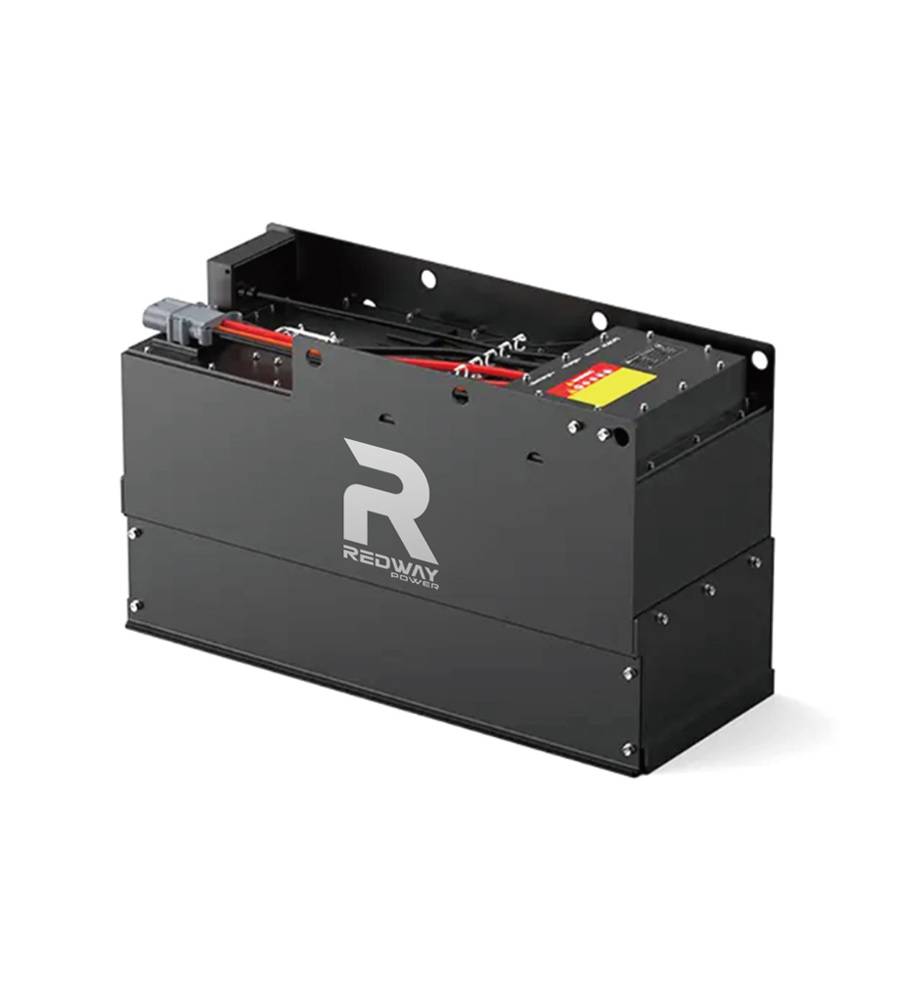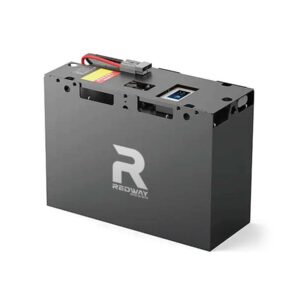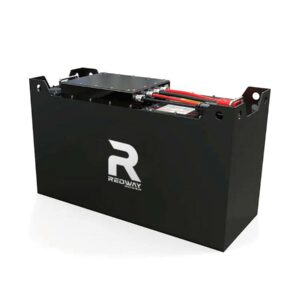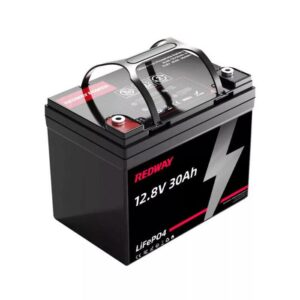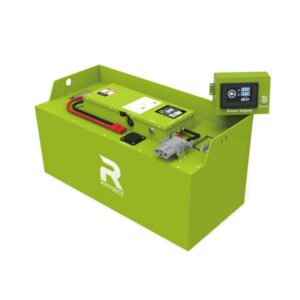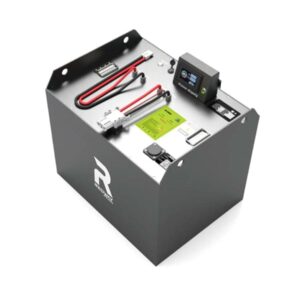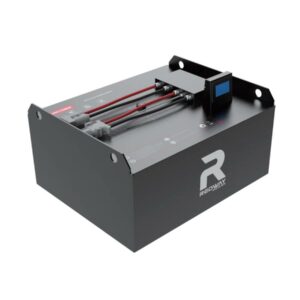Description
Our 48V 200Ah LiFePO4 Forklift Battery is a cutting-edge industrial energy solution engineered for demanding material handling tasks. As a leading lithium battery manufacturer, we specialize in OEM-ready designs that deliver unmatched durability, efficiency, and cost savings for warehouse operations and logistics fleets.
Key Features
Extended Runtime: 200Ah capacity provides 9.6 kWh energy output, equivalent to 240Ah lead-acid batteries with 30% weight reduction for enhanced forklift maneuverability.
Cycle Dominance: 3,000+ full-depth discharge cycles ensure 5-8 years of service life, outperforming traditional batteries by 400% in longevity.
High-Power Delivery: Sustains 600A continuous/800A peak current for heavy lifting operations without voltage drops.
Military-Grade Protection: IP65-rated metal housing resists dust, water jets, and mechanical impacts in harsh warehouse environments.
Intelligent Monitoring: Multi-layer BMS prevents overcharge, overheating, and cell imbalance while enabling real-time SOC tracking via CAN communication.
Product Description
Designed for OEM integration, our 48V 200Ah LiFePO4 Forklift Battery combines modular architecture with rapid-charging capabilities, achieving 0-80% charge in 2 hours at 1C rate. The compact 522¡Á315¡Á618mm footprint allows seamless retrofitting into Class I-III forklifts, while the vibration-resistant structure ensures stable performance across -20¡ãC to 60¡ãC temperature ranges.
Customizable voltage configurations (48V) and terminal types cater to global forklift models, supported by flexible OEM/ODM services. Our lithium battery solutions reduce total ownership costs through zero maintenance requirements and 25-day expedited global shipping (FOB/EXW/CIF terms).
How Does a 48V 200Ah Lithium Forklift Battery Improve Efficiency and Cost?
A 48V 200Ah lithium forklift battery significantly enhances forklift efficiency by delivering longer run times, rapid charging, and minimal maintenance compared to lead-acid batteries. It boosts productivity through opportunity charging and reduces total ownership costs with extended lifespan and energy savings. This battery is ideal for demanding multi-shift forklift operations requiring reliability and performance.
What are the key benefits of using a 48V 200Ah lithium forklift battery?
Lithium forklift batteries offer longer operational hours, faster recharge cycles, and reduced maintenance requirements. They typically last 2 to 4 times longer than lead-acid batteries, improve energy efficiency by up to 40%, and enable opportunity charging during breaks, maximizing uptime and operational productivity.
How does a 48V 200Ah lithium forklift battery enhance productivity and reduce downtime?
These batteries fully charge in under two hours and support fast opportunity charging during short breaks, eliminating the need for battery swaps. Their flat discharge curve ensures consistent power output throughout use, allowing forklifts to operate longer without power drops or interruptions.
What is the total cost of ownership for lithium forklift batteries compared to lead-acid?
While lithium batteries have a higher upfront cost, their longer lifespan, lower energy consumption, minimal maintenance, and reduced downtime translate into significantly lower total cost of ownership. Savings from reduced labor, energy bills, and fewer battery replacements contribute to a rapid return on investment, especially in high-utilization fleets.
How long does a 48V 200Ah lithium forklift battery typically last?
Lithium forklift batteries can last 2 to 4 times longer than traditional lead-acid batteries, often enduring thousands of charge cycles with minimal capacity loss. A 48V 200Ah battery can reliably support multi-shift operations for several years when properly maintained.
What maintenance practices are essential for lithium forklift batteries?
Maintenance is minimal but important: keep batteries clean, inspect connectors regularly, avoid deep discharges, and monitor state-of-charge indicators. Unlike lead-acid batteries, lithium types require no watering or equalizing but should be serviced by trained technicians to handle electronic components safely.
How does opportunity charging work for lithium forklift batteries?
Opportunity charging allows partial recharging during short breaks without waiting for a full charge cycle. This flexibility keeps battery charge levels high throughout shifts, enabling continuous forklift operation and eliminating downtime caused by battery swaps or lengthy charging sessions.
What safety and environmental benefits do lithium forklift batteries provide?
Lithium batteries reduce workplace hazards by eliminating acid spills and toxic fumes typical of lead-acid batteries. They also have a smaller carbon footprint due to higher energy efficiency and longer lifespan. Proper recycling further minimizes environmental impact, supporting sustainable industrial operations.
How do battery capacity and voltage impact forklift performance?
Battery capacity (Ah) and voltage determine the energy available to the forklift. A 48V 200Ah battery provides a balanced combination of power and runtime suitable for many industrial applications. Higher capacity increases runtime but may add weight and cost, while voltage affects motor compatibility and power output.
How should you choose the right lithium forklift battery capacity and voltage?
Choosing the right battery depends on forklift power needs, shift duration, budget, and operating conditions. For longer shifts or heavier loads, higher capacity batteries may be preferable. Budget-conscious operations with shorter shifts might opt for moderate capacities. Consulting with manufacturers ensures optimal battery selection.
What are the best practices for storing and handling lithium forklift batteries?
Store batteries in cool, dry environments away from direct sunlight and metallic objects. Avoid fully discharging before storage and maintain a partial charge. Handle batteries carefully to prevent damage and overheating. Follow manufacturer guidelines for charging and storage to maximize battery life.
How does temperature influence the performance and lifespan of lithium forklift batteries?
Lithium batteries maintain capacity better than lead-acid types in cold environments and support fast charging. However, extreme temperatures can reduce efficiency and lifespan. Charging in very cold or hot conditions should be managed carefully to avoid damage. Temperature-controlled storage and charging optimize battery health.
Battery Capacity and Voltage Comparison Chart
| Battery Model | Voltage (V) | Capacity (Ah) | Typical Runtime | Suitable Application |
|---|---|---|---|---|
| 48V 200Ah | 48 | 200 | Moderate | Standard forklift operations |
| 51.2V 280Ah | 51.2 | 280 | Extended | Heavy-duty, long-shift usage |
| Lead-Acid Equivalent | 48 | 200 | Shorter | Lower upfront cost, less efficient |
Charging Time Comparison Chart
| Battery Type | Full Charge Time | Opportunity Charge Time | Cooling Off Required |
|---|---|---|---|
| Lithium-ion (48V) | < 2 hours | 15-30 minutes | No |
| Lead-acid | 8+ hours | Not practical | Yes |

